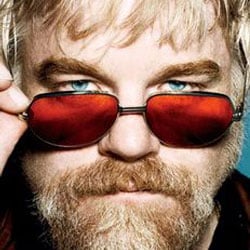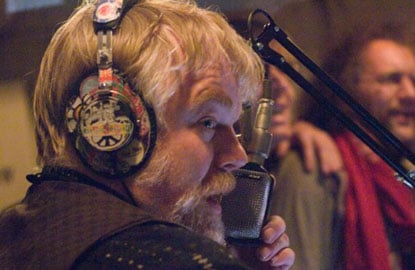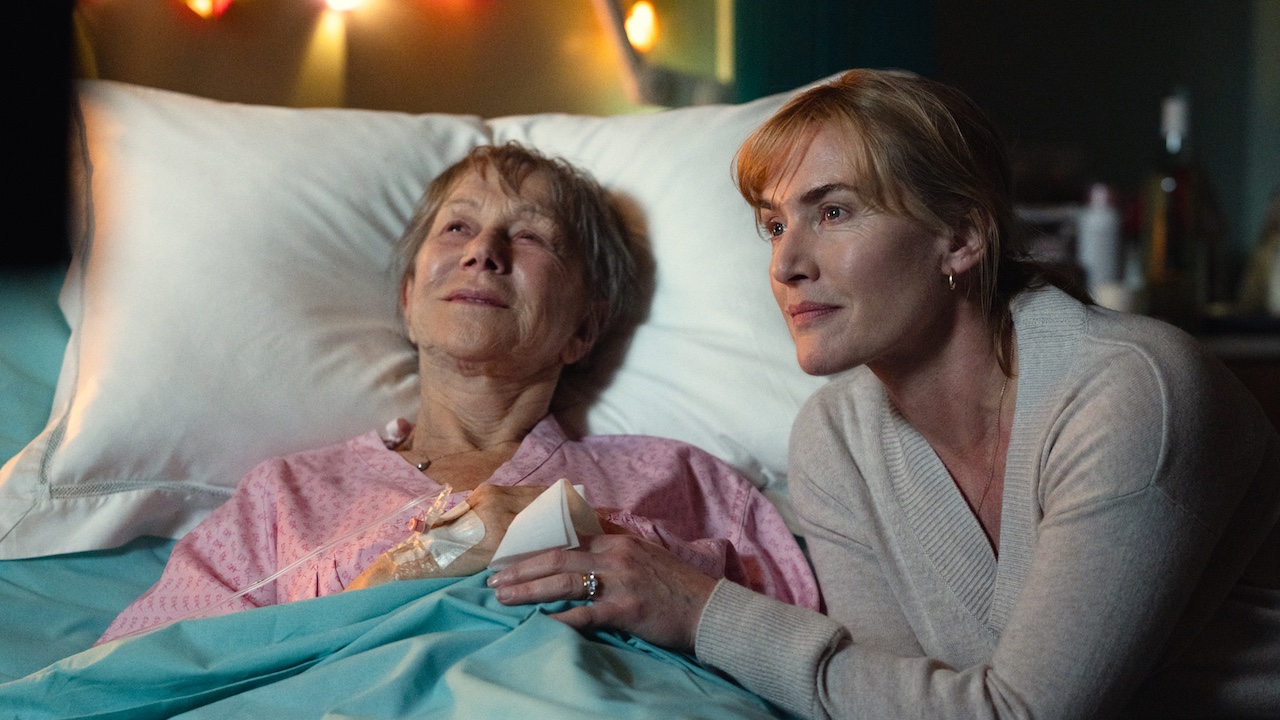Interview: Pirate Radio's Philip Seymour Hoffman

According to Pirate Radio’s trailer, rock and roll played loudly throughout Britain until the government said no more. Okay, that sounds about right. The whole “until one American DJ and a band of renegades launched a radio station on the high seas” thing? Well, not entirely. Philip Seymour Hoffman may be the most well known actor in Pirate Radio, particularly in the US, but he’s certainly not the star of this film and is eager to set the promotional material straight.
His character, The Count, is the sole American DJ aboard Radio Rock, a boat floating in the North Sea just outside the British government’s authority. It provides 24 hours of pop and rock a day until the government decides it’s time to sink their ship and outlaw them completely. The Count was just one of eight DJs determined to, in The Count’s words, “broadcast from this ship 24 hours a day until the day I die. And then for a couple days after that.”
Check out what Hoffman told our roundtable interview about his experience with music, working on a boat and his acting inspirations.
In one scene, a DJ desperately tries to save some records from being lost at sea. If you were in that situation, or if there was a fire in your home, what music would you save?
I wouldn’t do it. I’ve got to be honest with you, I would be thinking of other things. [Laughs] That’s a single man, you know what I mean? It’s a different thing, that character. What’s moving about that moment is that that’s what that character has. Because, you remember, you see him early on and it’s like, people don’t even know he’s there. Remember? It’s like he really is full time, 24/7. That’s his love affair. And they’re all having that love affair but me? Family and stuff. If I could get out of the house with the family, everything else could burn.
Do you have any favorite music that you discovered on the radio?
Oh god! I like so many different kinds of music just because all I did was listen to the radio as a kid. I didn’t really buy LPs or go to concerts. I wasn’t really a connoisseur really in that way. I was just, you know, I’d sit in the back of the car and listen to the radio in the summertime. I was that kid. So therefore, it’s amazing all the different kinds of music I like because of that. You know, my dad would listen to jazz at night. I was introduced to a lot of different kinds of music without any being shoved down my throat or being kind of swept up into the whole, you know, I’m going to follow the Grateful Dead or something. I didn’t have any of those experiences.
Your Daily Blend of Entertainment News
How was it living on the boat?
I showed up after they’d been shooting for two weeks. I was working. So I missed out on that fun. I never slept on the boat. Thank god actually. It’s very tiny.
Do you like going on cruises?
I’ve never been on a cruise. I loved working on a boat though. We had a great time shooting but the sleeping quarters aren’t comfy.

This film seems much more gentle than others you’ve done.
It’s a real ensemble piece. No matter how much they’re trying to show – cause you know how good those radio ads, it’s like ‘An American comes on …” it’s like, what the fuck’s this story? [Laughs] It’s a real ensemble piece, there’s no real lead in it. If there is any protagonist it would be Tom [Sturridge]’s character. You know, the young guy. That’s kind of the guy you’re following through the movie. I’m just one of the DJs on the boat but that’s part of it, it’s juts kind of like sharing that burden with all which is kind of what the character’s going through anyway. They really are sharing a burden that they feel really strongly about. I think the movie itself has an energy about it that, you know, they’re looking to have a good time, mostly. So that could be fun to be had with those guys especially because those actors, Nick [Frost], Rhys and all those guys, they’re really truly funny guys, so it wasn’t that hard. I didn’t have to do much. I kind of let them, I kind of sat back and enjoyed myself a lot of the time to be honest and it was nice.
Did you get to improvise?
Yeah! We did some of that, we did some of that. Richard’s a pretty sharp writer though, you know, so I tried to follow what he had but he was encouraging if it needed it but he’s a writer, he’s a real writer so his ideas about what to say would usually be more funny so I tried to really hear him out there.
Where does your passion and energy for acting come from?
I first had a great passion for theater as a patron. When I was about 12 or 13 I was a patron of theater and I loved it. Huge passion for it. I just did. Why that is, I don’t know but I did and so that’s really what it still is. How I got on the other side of it is really – I’m still trying to find out whether that was a mistake or not and I mean that half jokingly, half not. You know what I mean? Because my passion truly was seeing, watching, going to the theaters is really I think one of the rare gifts that we have that a culture can offer a person. I learned that at such a young age is a lot to do with probably why I became involved with trying to create it myself whether it be live theater or film. Why I’ve directed and acted, why [it] hasn’t just been acting. Obviously I have an interest in the whole thing. I produced things, I’ve directed – that it’s out there. Evidence just of being involved in things that hopefully will effect or will be a reason for someone to go, like I have reason to go.
How do you find the energy, night after night, to perform in a play? Especially in Othello; it’s such a long play. What’s your secret?
There’s no secret, you just – I’ve done a lot of theater. I mean, I was in Long Day’s Journey Into Night, which was four hours long too. Actually, probably a little bit longer than, ultimately the Othello we just did. And I’ve done one acts, I’ve done two acts, True West. We were on stage for two hours straight without leaving and that itself is kind of like a four-hour play in all. It’s just the two of you. So I’ve had those experience in the theater and, well, there’s no secret, I just think it’s a – it’s a long conversation. It’s weeks of rehearsal and a level of trust and vulnerability with other artists who are standing right in front of you, in front of people watching you, it’s an incredibly complicated situation that’s very alive and full of traps and success and joy and sadness and inspiration, dead weight and, you know, it’s an incredible thing. Something that I think is, if not experience, it’s an incredible thing.
So, you’re making your directorial debut with Jack Goes Boating.
Yeah, we’re almost done, we’re in post. I loved it. Like I was saying earlier, I loved directing it. I didn’t like doing both so much. Too much attention. Too much time. Directing is a really kind of amazing thing cause you’re helping others and in the middle of that you have to worry about yourself is really kind of annoying but I think we pulled it off. I like what we did and we’ll see. It’s going to come out soon, I don’t know, next year.
How do you choose what to direct and act in? I’m sure the range of material is vast. What did it take to make the decision that the play, Jack Goes Boating, should be made into a movie?
Well, other people had that idea too. It wasn’t me. That’s the thing, people think because maybe I’m the more well known name on the project that I somehow woke up one morning and am like ‘Jack Goes Boating will be made!’ [Laughs] ‘People follow me!’ It’s not like that at all, it’s more like, I’m laying there going ‘What the fuck am I gunna do? I’m tired.’ It’s organic, it’s something – you guys know, it’s life.
Staff Writer for CinemaBlend.

